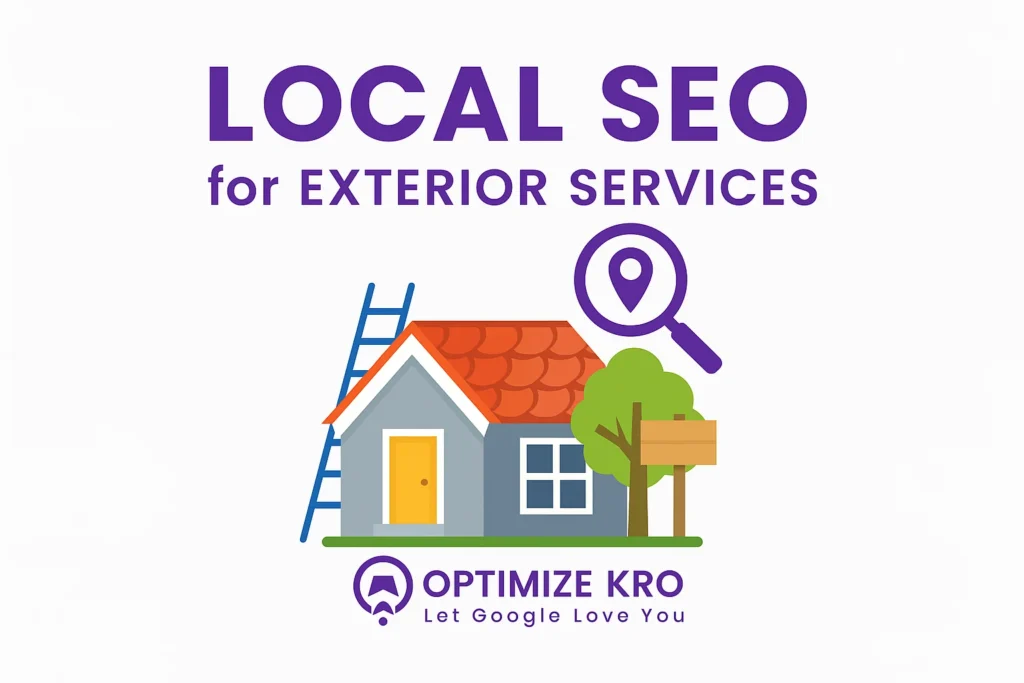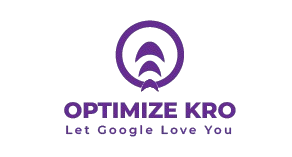Introduction: Why Local SEO Matters for Exterior Services

If you run an exterior services business — think roofing, siding, exterior painting, pressure washing, fencing, landscaping, or gutter cleaning — most of your customers live or work within a short drive. They don’t search for “best roofing company USA”; they search for “roofers near me” or “roof repair in [your town].” Local SEO is the set of tactics that make sure your business appears when those nearby customers are searching with purchase intent.
Imagine a homeowner in rain season: they need a roofer now. Which businesses show up in the map pack and top local results? Those businesses win calls and jobs. That’s the power of local SEO: turning local searches into paying customers.
- Introduction: Why Local SEO Matters for Exterior Services
- Understanding Local SEO Basics
- Keyword Research for Exterior Services
- Google Business Profile (GBP) Optimization
- On-Page SEO for Service Pages
- What Our Clients Say
- Local Schema Markup & Technical SEO
- Reviews & Reputation Management
- Local Citations & Directory Listings
- Local Link Building & Partnerships
- Content Strategy for Local Authority
- Maps, Service Areas & Multi-Location Strategies
- Paid Local Ads & Hybrid Strategies
- Measuring Success: KPIs & Tools
- Common Mistakes to Avoid
- A 30-Day Local SEO Action Plan for Exterior Services
- Conclusion
The unique nature of exterior services
Exterior work is tactile, visual, and trust-driven. Customers want proof: before/after photos, reviews, licenses, and quick local availability. Local SEO lets you showcase these trust signals where they matter most — in search results, maps, and on your site.
How customers search for exterior pros
They use phrases like:
- “Exterior painters near me”
- “Gutter cleaning [city name]”
- “Emergency roof repair [zip code]”
Your job is to be the business they find first.
Understanding Local SEO Basics
Local SEO is built on three pillars: On-site optimization, Google Business Profile (GBP) optimization, and off-site signals (reviews, citations, links). Think of them as a three-legged stool — if one leg is wobbly, the whole thing falls.
Local search vs. national search
National SEO chases broad keywords and scale. Local SEO is hyper-focused: geographical intent + service intent. That means optimizing for phrases tied to places, neighborhoods, and local problems.
The Local Pack and why it’s gold
The Local Pack (the map + top 3 businesses) gets most clicks for “near me” searches. If you’re not in that pack, you’re missing the majority of high-intent traffic.
Keyword Research for Exterior Services
Keyword research for local businesses should target the specific services + locations + intent (e.g., “install”, “repair”, “estimate”).
Short-tail vs. long-tail local keywords
- Short-tail: “roofers [city]” — competitive, broad.
- Long-tail: “residential roof repair after storm [neighborhood]” — lower volume, higher conversion.
Mix both: use short-tail on landing pages and long-tail in blog posts and FAQs.
Tools and techniques
Use free and paid tools: Google Keyword Planner, Google Autocomplete, “People also ask”, Ahrefs, Semrush, and local keyword finders. Don’t forget to check Google Maps suggestions — they reveal real local queries.
Example keyword map
- Service Page: “Exterior painting [city name]”
- Blog Post: “How to choose exterior paint for coastal homes [city/region]”
- FAQ: “How often should I pressure wash siding in [city]?”
Google Business Profile (GBP) Optimization
GBP is your digital storefront on Google Maps and search. Optimize it like a landing page.
NAP consistency and categories
Use consistent Name, Address, Phone across GBP, website, and directories. Choose primary & secondary categories precisely (e.g., “Roofing contractor,” “Exterior painting service”).
Photos, services, and posts
Upload high-quality before/after photos, service images, and regular posts (offers, completed projects). Listings with photos get more clicks.
GBP Q&A and messaging
Answer Q&A proactively. Turn common questions into posts and website FAQs. Enable messaging if you can respond fast — leads like instant contact.
Read More:
Local SEO for Custom Home Builders
Local SEO for Home Extensions
Local SEO for Home Additions
Local SEO for Handyman Services
On-Page SEO for Service Pages
Your website must be structured to match how customers search.
Page structure & content for each service
Create separate pages for each core service: “Exterior Painting [City]”, “Roof Repair [City]”, etc. Each page should have:
- A clear H1 with service + location.
- 400–900+ words focusing on benefits, process, pricing signals (ranges), and calls-to-action (CTA).
- Gallery of local projects.
- Schema markup for LocalBusiness.
Meta titles, descriptions & headers
Write clickable meta titles that include the main keyword plus location and a benefit: e.g.,
Title: “Exterior Painting in Springfield — Fast, Weather-Ready Results”
Meta description: “Top-rated exterior painters in Springfield. Free color consults & 5-year warranty. Call for a same-week estimate.”
Sample meta title + meta description
Meta Title: Exterior Siding Repair in [City] | Free Inspection Today
Meta Description: Local siding repair experts in [City]. Same-day estimates, licensed pros, and long-lasting results. Book online or call now.
What Our Clients Say
Trusted by contractors and local businesses for proven Local SEO Services.
John M. – General Contractor
“These guys transformed my Google Maps ranking. More calls, more local leads, and better visibility!”
Sarah L. – Roofing Business
“Within 3 months, my business went from page 3 to the top 3 listings. Highly recommend their Local SEO service!”
David K. – Plumbing Services
“Affordable and effective SEO. My local service calls doubled in less than 90 days.”
Local Schema Markup & Technical SEO
Schema tells search engines who you are, what you do, and where you operate.
LocalBusiness Schema examples
Use JSON-LD LocalBusiness schema with properties: name, address, telephone, openingHours, geo, priceRange, service offered. Include images and aggregateRating if available.
Mobile speed, crawlability & indexability
Exterior searches are often mobile. Mobile speed and clean technical structure (sitemaps, robots.txt, secure site) are critical. Use lazy-loading for images but ensure core content loads fast.
Reviews & Reputation Management
Reviews are the lifeblood of local trust.
How to get more 5-star reviews
- Ask after a completed job — in person and via SMS/email.
- Make leaving a review frictionless: send direct GBP review links.
- Offer excellent experience: punctuality, photo documentation, follow-up.
Handling negative reviews like a pro
Respond quickly, empathetically, and offer to fix. Publicly demonstrate care — prospects watch responses as closely as reviews themselves.
Local Citations & Directory Listings
Citations are mentions of your business on other websites — crucial for local authority.
High-value directories for exterior services
List on: Yelp, Houzz, Angi, Thumbtack, HomeAdvisor, YellowPages, and local chamber of commerce. Industry-specific and local newspapers matter.
Tools to manage citations
Use Moz Local, BrightLocal, Yext, or Whitespark to find and fix inconsistent listings at scale.
Local Link Building & Partnerships
Links from local partners tell Google you’re part of the local ecosystem.
Community sponsorships, suppliers & vendors
Sponsor a Little League team, co-create content with suppliers (paint manufacturers, roofing material vendors), and get links from supplier pages.
Content-driven link strategies
Produce local case studies (“How we restored 50 homes after the 2024 storm”), guides, or neighborhood spotlights that other local sites will naturally link to.
Content Strategy for Local Authority
Content builds trust and captures long-tail traffic.
Blog ideas & local guides
- “Best exterior paint choices for coastal homes in [Region]”
- “Seasonal roof maintenance checklist for [City] homeowners”
- “How to spot storm damage after a windstorm in [County]”
Seasonal content for exterior businesses
Create campaigns around spring cleaning, monsoon season, winter prep — tie them to promotions and GBP posts.
Maps, Service Areas & Multi-Location Strategies
How you represent service areas matters.
Service-area vs. location pages
If you have a physical storefront, make a location page. If you’re a service-area business (you travel to customers), set service-area settings in GBP and create city-specific service pages.
Managing multiple GBPs without spam
Each physical location gets a GBP. Don’t create fake locations to rank — that’s against guidelines and will hurt long-term trust.
Paid Local Ads & Hybrid Strategies
Sometimes a hybrid approach accelerates lead flow.
When to use Google Ads & Local Services Ads
Use Google Ads for immediate lead spikes and Local Services Ads (LSAs) to appear at the top of local queries with a “Google Guaranteed” badge (where available). LSAs suit high-intent service categories.Budgeting for local campaigns
Allocate funds to test campaigns: start small, track CPA (cost per acquisition), and scale what converts.
Measuring Success: KPIs & Tools
Track metrics that align with revenue, not vanity.
What to track (calls, leads, rankings)
- Calls from GBP & website
- Form submissions & booked appointments
- Map pack rankings for core keywords
- Review growth and citation count
Recommended dashboards & reports
Use Google Analytics (GA4), Google Search Console, and a call-tracking solution. Combine in a weekly dashboard to spot trends.
Common Mistakes to Avoid
Avoid shortcuts that appear to work short-term but harm long-term.
Over-optimizing & keyword stuffing
Don’t cram location names unnaturally into pages. Write for humans first.
Ignoring reviews & local content
Many businesses ignore review replies and local content — this wastes easy ranking opportunities.
A 30-Day Local SEO Action Plan for Exterior Services
Want a quick win plan? Here’s a practical 30-day checklist.
Week-by-week checklist
Week 1 — Foundation
- Claim & verify GBP.
- Ensure NAP consistency across website and main directories.
- Create/optimize core service pages with location-focused H1s.
Week 2 — On-site & GBP polish
- Add LocalBusiness schema to main pages.
- Upload 10+ high-quality photos to GBP (before/after shots).
- Publish one local blog post.
Week 3 — Reviews & citations
- Send review requests to recent customers (email/SMS templates).
- Audit top 20 local citations; correct inconsistencies.
- List on 3 industry directories (Houzz, Angie’s List, HomeAdvisor).
Week 4 — Links & measurement
- Reach out to 5 local partners for link swaps or sponsorship features.
- Set up call tracking & GA4 conversion events.
- Create a simple dashboard: calls, form leads, GBP views, and ranking snapshot.
Conclusion
Local SEO for exterior services is less about high-tech wizardry and more about consistent, trust-building work: accurate business info, compelling local pages, strong reviews, visible photos, and community links. Follow the steps above, track what matters, and prioritize the local signals (GBP, reviews, citations). Do that, and you’ll turn local searches into steady, high-value jobs.
Local SEO improvements (GBP optimization, citation fixes, and first reviews) can start showing impact in 2–6 weeks, but consistent ranking gains typically appear over 3–6 months. Think in seasons — steady work compounds.
No — create separate city-service pages when you serve many towns. One page per service per city scales better for rankings and conversions.
Quality beats quantity. Aim for steady growth and timely responses. If competitors have 50 reviews, prioritize getting 20–30 solid, recent reviews with detailed descriptions and photos.
LSAs are useful if available for your service type and location — they can deliver high-intent leads fast but cost more. Use them to supplement organic efforts, not replace them.
Optimize your Google Business Profile: correct categories, add 10+ photos, publish a post or offer, and request review links from past customers. That alone moves the needle fast.

Gulfam Qamar is a seasoned Local SEO expert with a proven track record of helping businesses boost their online visibility and dominate local search results. With deep expertise in Google Business Profiles, on-page optimization, and local citation strategies, Gulfam helps brands connect with nearby customers and grow sustainably. When he’s not optimizing websites, he’s sharing actionable SEO tips and insights to empower small businesses in the digital space.

